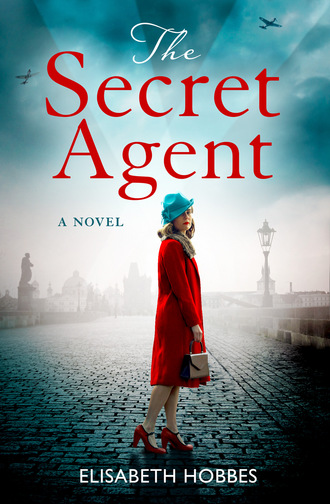
Полная версия
The Secret Agent
But discovery never came. After what felt like hours, she heard the sound of the table being moved overhead and the trapdoor opening. Sylvie clambered out of the hole and together, not speaking, she and Papi covered the trapdoor again. It was only when they were seated at the table dipping stale brioche into bowls of coffee that Sylvie began to tremble. ‘I thought they were here for me,’ she said.
Papi sighed. ‘So did I.’
‘It appears my neighbour’s son has been making his opinions about the Führer known rather loudly in places he should not have been. He had Jewish friends who disappeared in the night and he doesn’t know where they went.’ Eloise closed her eyes. ‘The Germans who took him were in uniform, not men in black coats with black cars, so maybe he will escape with a flogging or short imprisonment.’
Sylvie said nothing. There was nothing to say. The boy may come back, or he may not. His friends could have been among the lucky ones who escaped, but most probably not. Eloise gathered the empty coffee bowls.
‘You can sleep on the top floor in my room. The bus to Nantes leaves at eight. Make sure you are on it, and God protect you in your fight.’

The next morning, Sylvie finished her journey to a village on the outskirts of Nantes on a local bus, sitting beside a garrulous woman who spent the entire journey telling Sylvie about her ailments. Whether or not the woman was part of the Resistance network or not, Sylvie never found out, but it meant that when she left the bus, the pair of Germans patrolling saw two women, who had obviously known each other for years, saying goodbye.
Sylvie completed the final part of her journey alone with a sense of awe. She had been smoothly passed from person to person. So many lives were being risked for her sake and that of France. Now she was here, she now had a much fuller appreciation of the network that stretched across France. A network she was now a part of. She might be tired and travel-stained, but her sense of determination was redoubled. SOE and the Resistance had to succeed. She must not appear nervous or suspicious or she would get no further than the first control point. She hoisted her bag and suitcase – lighter now she had passed on whatever the mysterious contents of the biscuit tin had been – and continued on her way.
She followed her nose as she walked the two miles into the centre-ville then sat on the edge of a fountain in the square. Nantes was a city Sylvie was unfamiliar with, which meant that she was unlikely to be recognised and exposed. It also meant, however, that when she sat on a wall outside the Nantes-Orléans railway station at the appointed time and Marcel did not arrive to meet her, she had no one to turn to for help. At first she was not worried. She waited for a quarter of an hour, keeping her eyes peeled for a blond man with a red band in his hat to approach and give her the first part of the code exchange. She left at twelve fifteen precisely, having been told to wait no more than fifteen minutes. She was supposed to return at two o’clock and then again at four and six and every even numbered hour until Marcel appeared. When eight o’clock came and went that evening, Sylvie began to grow more concerned. She wondered if she or the final contact had made an error and the meeting should have been at the Paris-État station where freight was brought into the city. If that were the case, the meeting would have to wait until the following morning. The Paris-État station was now entirely for the use of the German army, and anyone French who frequented the area was unlikely to be an upstanding member of society. To go there on her own in such a place at ten at night would attract unwanted – and probably unpleasant – attention. At every stage of the journey she’d seen women loitering on the streets, offering themselves with resignation or desperation to passers-by. To Sylvie’s mind, the curiosity of German authorities was barely worse than the interest of French men looking for a good time with a prostitute.
She found a bistro and ordered some food. While she ate the bowl of thin onion soup, she ran through the implications. They were stark. Something had prevented Marcel from making the rendezvous. Did it mean the entire unit had been discovered? And if so, had Marcel managed to hold out for the expected twenty-four hours needed to abandon the safe houses and cover all traces of other members? She might have come to a town deserted by the network. If that were true, it had happened in the past three days because otherwise her mission would have been pulled before she left England.
The sky was completely dark when Sylvie left the bistro, wincing inwardly at the cost of her meal. Inflation had hit France hard, and it seemed people had become resigned to paying more to receive less. Nevertheless, her brief rest had fortified her spirits, and now she had a plan. There was no way for Sylvie to contact anyone in England. She was in limbo, waiting, but at least she knew where she could begin her search for someone in the network who might help her. She had a cover story and an identity. A job was waiting for her in the city.
Swinging her suitcase and trying to keep her spirits high, Sylvie wove her way through the narrow streets of the old town in search of the nightclub named Mirabelle.
Chapter Four
From the outside, Club Mirabelle looked run down. It stood halfway up a narrow road on a hill leading away from the river. Perhaps before the destruction wrought on Nantes by the war and subsequent occupation, this would have been a high-end establishment, but now it showed evidence of neglect.
The club was double-fronted in one of the three-storey buildings that lined the street. A plain black door was set between wide windows that at some point had been boarded up with black-painted wooden planks. It could have been due to the war and the need to block out any escaping light, but Sylvie suspected the alterations had been done prior to that in order to create an atmosphere. The sign outside looked strikingly old-fashioned. A laughing woman held out the flounces and ruffles of her skirts to display one leg raised in a high kick. In her right hand, she held a flute of champagne that appeared to defy the laws of physics given the tilt of the glass. The club’s name curled in cursive script from leg to arm. Perhaps this was Mirabelle herself.
If she had been in England, Sylvie would have turned her nose up at any suggestion she spent an evening there. Still, she reasoned, disreputable might mean it was less likely to be frequented by Germans and she would stand less chance of being discovered for who she was.
Sylvie pushed the door ajar ever so slightly and was greeted by the sound of laughter and piano music. Seedy and down at heel it might be, but Mirabelle was busy tonight. She hesitated, wondering if the middle of a busy evening was the best time to try to make contact with someone, or whether she should return tomorrow when there would be fewer witnesses to the conversation she needed to have.
She was still wavering indecisively when voices speaking German made her start. A quartet of soldiers in uniform were making their way down the empty street towards the door. Sylvie tensed, recalling the brutal arrest of the boy in Cholet, but they were strolling, not goose-stepping. They were off duty, not a patrol out to round up suspects for interrogation.
They walked two abreast, and one in the first pair nudged his young companion and gestured towards Sylvie. The two walking behind spoke in German to each other, laughing. It was obvious to Sylvie that the young man was being teased and that she was the subject.
‘Are you going inside, fräulein?’ asked the man who had begun the joke, switching to halting French.
‘She is waiting for you, Valter,’ said the oldest and, from the insignia on his uniform, the most senior officer of the group.
The young soldier looked visibly relieved that the attention had moved on from him and stepped aside to let his superior – presumably, ‘Valter’ – pass him and kept his eyes firmly ahead as if he was standing to attention on the parade ground. Sylvie suspected nothing short of a direct order from the Führer himself could have induced him to meet Sylvie’s eye.
‘Maybe she is waiting for all of us,’ Valter replied.
Sylvie’s scalp prickled. She could probably fend off one man, but not four. She hid her revulsion and gave him a smile, hoping it was just bravado. He straightened up and looked pleased with himself. Men were men, it appeared, whatever nationality they were.
Without replying, she opened the door fully and stepped inside.
Mirabelle had seen better days inside as well as out. The room went on further back than Sylvie had expected from the outside. Small circular tables were set for couples or groups in front of both sides of the door and throughout the room. Most were occupied. A raised stage area ran along the left side of the room. The bar covered the back-right-side wall. Between them was an arch covered with a pair of burgundy velvet curtains.
Besides the stage was a piano where a dark-haired man in a black dinner jacket sat with his back to the door. He was currently playing something almost like jazz, with a languid rhythm that made Sylvie’s fingers begin to drum against the side of her leg. His lean frame moved sinuously from side to side as his fingers worked along the keyboard. As Sylvie watched, he reached up and caught the lit cigarette that was tucked behind one ear, took a quick drag and put it back without losing his rhythm. Though he was only half facing the audience, Sylvie was sure he must be aware that all eyes were on him.
The club was dimly lit and the air was hazy with smoke. The intense odour of French cigarettes made Sylvie blink. Colognes and perfumes added another layer, and beneath that were the smells of warm bodies and alcohol.
It was sleazy and exciting.
The Germans had followed Sylvie inside and stood in the doorway, letting the cool air in. One of them clapped his hands and whistled loudly, a piercing sound that cut through the buzz of conversations harshly. The pianist stopped playing and glanced over his shoulder. He caught Sylvie’s eye, and she smiled instinctively. He remained stone-faced, shrugged and resumed playing, clearly dismissing her. Conversations resumed and the patrons went back to flirting or listening to the music.
From between the curtains, a middle-aged man appeared, wearing shirtsleeves and a waistcoat. He walked across the floor with a smile.
‘Good evening, gentlemen, mademoiselle. Is it a table for five?’
‘Well, fräulein,’ asked Valter, raising his eyebrows towards Sylvie. ‘Is it our night of fortune?’
‘Not tonight, gentlemen.’ Sylvie smiled with an air of regret she did not really feel and turned back to the waiter. ‘I am here to speak to the proprietor, on business.’
‘Business?’ The waiter narrowed his eyes. ‘What do you want?’
Sylvie was aware of the four Germans behind her who were undoubtedly listening to the conversation. She was making a complete mess of things. Any second now she expected to feel hands on her arms, dragging her away on suspicion of being a spy.
‘I am a dancer. I wanted to ask him if he needs any girls to work here,’ she said. ‘I’m trying all the clubs in Nantes. If you don’t, do you know anywhere that might have an opening?’
Behind her, the Germans made enthusiastic noises of encouragement. The waiter pursed his lips. Sylvie was dimly aware that the pianist had finished the song and had begun another, languid and quiet. Everyone in the club would be listening in to the conversation.
‘I am Monsieur Julien,’ the man said eventually. ‘I own this club. It is me you need to speak to.’
Sylvie blushed. She had been convinced from his attire that he was staff, not management. ‘I’m sorry, I didn’t realise.’
Monsieur Julien scrutinised her and seemed to come to a decision.
‘Let me attend my customers, then we can talk. Adele, see to these gentlemen, please.’ He snapped his fingers and a young, very pale blonde woman dressed in green silk came from behind the curtain. Adele paused to look Sylvie up and down then led the party of Germans away to an empty table, leaving Sylvie alone with Monsieur Julien.
‘Well, mademoiselle,’ he said. ‘You have made quite an entrance. Do you have a name?’
‘Sylvie Duchene.’ It felt good to be reverting to her old name.
He sucked his teeth. ‘I do need another dancer. My best girl got herself in the family way and left. But why should I employ you without credentials? Where have you been dancing?’
Sylvie hesitated before answering, gathering her thoughts. ‘In Angoulême. The theatre was hit in the bombing raid two weeks ago. Fortunately, no one was performing at the time, but the troupe was disbanded as there was nowhere for us to perform.’
‘Let her dance, Herr Julien!’
They both turned to the voice that had hollered from the back of the room. The Germans who had followed Sylvie inside were seated at a table now with a bottle of wine. They raised their glasses and cheered. Monsieur Julien crossed his arms and looked at Sylvie, assessing her. She wasn’t sure if the intervention had done her any favours, or quite the opposite.
‘I am quite particular in who I employ. You might not have all the skills I require.’
He was right to be wary. Sylvie knew he was sympathetic to the Resistance, but she should have been introduced by Marcel, not appear alone. He was risking a lot by allowing a SOE agent to come within his walls, and Sylvie could not openly admit to the existence of the organisation. Not when surrounded by Germans.
‘Please,’ she begged, feeling desperation well inside her. ‘This wasn’t how I planned to ask.’
She looked into Monsieur Julien’s eyes and was met with scrutiny in return. They looked like they belonged in an older face, dark and sharp. He glanced down at the suitcase at Sylvie’s feet then looked her up and down, taking in the sensible lace-up shoes and woollen skirt beneath her bottle-green coat.
‘Do you have clothes you can wear to dance?’ he asked after what felt like forever.
‘Most of my costumes were destroyed, but I have one good dress and my shoes,’ Sylvie answered. She had no idea what it must have taken to obtain them, but in the suitcase Marianne had given her there was a dress that would be perfect stage outfit along with a second dress, a skirt and two blouses for day to day wear. SOE prepared their agents well.
‘Good.’ Monsieur Julien drew Sylvie towards the back of the room, slipping his arm into hers, and leaned close. ‘You have a trial for one week. If anyone else arrives who I think is better, you will have to leave. Is that understood?’
‘Thank you.’ Sylvie let out a breath of relief.
‘Céline,’ Monsieur Julien called out sharply. A few moments later another pretty blonde woman stuck her head out from between the curtains. ‘We might have found a new dancer.’
The woman raised an eyebrow in Sylvie’s direction.
‘You can put your things behind the curtain for now,’ Monsieur Julien said. ‘Watch tonight. Speak to the girls when they’re not onstage and see if you can learn some steps. Tomorrow afternoon, come here. You can perform with them, and I’ll decide then if you are suitable.’
Sylvie held out her hand. ‘Thank you, monsieur, you won’t regret this.’
He gave her another level stare. ‘Make sure I don’t or, I can tell you, Mademoiselle Duchene, I won’t be the only one who does.’
Tossing that veiled threat over his shoulder, he walked back behind the curtain, leaving Sylvie standing alone. She put her suitcase behind the velvet drapes and then sat on one of the stools beside the bar. She ordered a small glass of the cheapest wine and sipped it slowly as she watched Adele and two other women performing and tried to learn some of the routines. After the dancers left the stage to enthusiastic applause, the blonde woman Monsieur Julien had called Céline sashayed onto the stage.
Dressed in a silk floor-length gown with a beaded fur draped around her neck, she would have been striking in any case, but above her elegant costume she was stunningly beautiful with blonde curls and wide eyes. She sang in a sultry, throaty voice that left Sylvie reeling with envy. Dancing was one thing, but she had never been able to sing. Céline held the room as she performed, coming into the light or receding into the darkness; Sylvie knew without looking that every pair of eyes in the room were on Céline. She finished the performance leaning against the piano and looking into the eyes of the pianist with seductive intensity. He held her gaze, rising to his feet as he played. The effect was electric. Sylvie wondered if they might be sleeping together.
After the three songs had finished, Céline joined Sylvie at the bar. Sylvia congratulated her, which Céline accepted with a gracious shrug of the shoulders that suggested she was well used to such compliments and knew her talent. Now there was no one performing, and the bar was buzzing with conversation and gramophone music. Two wide-rimmed glasses appeared in front of the women. Sylvie looked at the bartender in surprise.
‘I didn’t order these.’ She glanced at Céline who had already picked up her crystal glass and was sipping the cocktail.
‘It was the officers at the table in the corner,’ the bartender answered.
Sylvie swivelled on her stool and looked across to the four Germans she had come in with. Seeing her looking, they raised their own glasses.
‘I can’t accept this.’ Sylvie pushed the glass away from her, shaking her head towards the men. They looked disappointed.
‘Don’t be foolish,’ Céline said. ‘It’s only a drink, and a free one at that.’
‘But what is the real price?’ Sylvie asked.
Céline dimpled and smiled. She lifted her glass towards the Germans, then took another sip. ‘Probably none. But ask yourself, what would be the cost of refusing it? You’re new in town, aren’t you? Don’t make enemies on your first evening.’
‘They are the enemy,’ Sylvie pointed out.
Céline drummed her long fingernails on the top of the bar. ‘Of course they are, but these particular men have done nothing to you, so why antagonise them? We all have to accept what has happened and do our best to make the best of it.’
Sylvie considered the singer’s words. France was full of collaborators who had, if not welcomed the occupation, done little to oppose it to it. She wondered if Céline was one of them. Or perhaps she spoke sense, and it would be foolish to cause a scene and bring attention to herself. She picked up the glass and raised it to her lips, smiling at the Germans over the rim. This was met with their approval. They shouted a loud toast in German and went back to talking among themselves.
‘Where are you staying?’ Céline asked.
‘Nowhere yet,’ Sylvie replied. ‘I hoped an old friend of my mother’s might put me up for a night or two, but when I went to her address, the whole street was rubble. I suppose I’ll try to find a hotel.’
She glanced at the stage, wondering if she might resort to sleeping on the bare wood wrapped in her overcoat. The pianist was in the process of arranging sheets of music and caught her eye. He gave her a measured look that made the roots of Sylvie’s hair stand up on end.
He was very handsome, with intense blue eyes and dark hair parted to the left. It was grown long to flip over his forehead and almost cover his right eye. Sylvie’s cheeks began to grow warm at being subjected to such open appraisal. He took the cigarette from behind his ear and put it to his lips, taking a long drag before stubbing it out on the ashtray balanced on top of the piano. He never took his eyes from Sylvie. When Sylvie kept her face perfectly immobile, he curled his lips slightly and carried on rearranging the pages as if she was beneath his notice.
‘There is a room in my building,’ Céline said. ‘It’s quite a walk from here, but it’s away from most of the places the army are quartered and probably not near enough to anything worthwhile that the Allies might try to bomb. Come home with me tonight, and I’ll speak to Madame Giraud and see what she says. The previous girl left a few weeks ago and it has been sitting empty.’ She tipped back her glass and smiled at Sylvie. ‘I have to go sing again. Stay here, and if any more drinks come that you don’t want save them for me.’
She glided across the floor, hips moving in a sultry fashion as if inviting the whistles and cheers that inevitably followed. She paused and spoke to the pianist, placing both hands on the top of the piano and leaning over. He scowled and muttered something, which caused her to laugh. She seemed unperturbed and, in fact, playfully swatted him across his arm with the fringe on her stole. From the body language, Sylvie was even more convinced that they were lovers or had been in the past.
Chapter Five
Céline’s apartment was above an épicerie in the middle of a row of tall houses. While Céline discussed whether Sylvie could have the room with her landlady, Madam Giraud, Sylvie looked around. This had probably been a thriving and well-to-do neighbourhood once, but now the shopfronts told the story of a city under the yoke of occupation. The charcuterie next door barely contained enough meat to fill one, let alone two, of the double-fronted windows, and Giraud et fils fruit-and-vegetable shop itself looked sorely empty. The hat shop, with gilt Art Deco lettering advertising its wares, on the other side was boarded up. The words Juden hier and a six-pointed star painted across the door and windows was a sickening explanation of why the business was no longer open. Sylvie had seen the same words and symbol repeatedly since she had arrived in France, and it chilled her to the bone to think of the owners being rounded up and taken to work camps simply on the basis of their faith.
‘I don’t know. Can I trust her?’ Madame Giraud eyed Sylvie coldly.
The woman was bound to be worried. Who would want to risk letting a stranger into her house? Sylvie could be an informer. But it seemed Madame Giraud’s concerns were more financial rather than for her safety because she added, ‘The last one ran off without paying what she owed.’
‘I can pay now,’ Sylvie said. ‘I can give you a month’s rent in advance.’
Madam Giraud’s eyes lit, and Sylvie was warmly ushered up to a small room on the third floor. Apparently, any reservations Madame Giraud might have had about inviting a stranger into her home were quashed by the prospect of regular and available rent money.
Like many buildings of its type, the ground floor was given over to the épicerie and storerooms. The first-floor was occupied by Madame Giraud, though there was no evidence of the son whose name was painted above the door. Céline, who turned out to be a great niece of Madame Giraud, occupied the large room on the top floor, leaving Sylvie a tiny room in the attic. At one end, it held a cast-iron bedframe and mattress, and a dressing table, closed off by a threadbare curtain. The other end of the room contained a table and a wooden chair. A single ringed oil stove was just big enough to heat a pan of water or milk.
It was a far cry from the bedroom at Sylvie’s father’s house and reminded her unpleasantly of the years she had spent at boarding school, sharing a dormitory with nine other girls. Nevertheless, it would certainly suffice until she managed to make contact with someone from the network.
The room contained no windows but had a skylight set at an angle in the roof. She opened it as wide as she could, then went to the tiny bathroom opposite Céline’s room. She could hear her new friend humming one of the songs she had sung.
All things considered, Sylvie decided, as she climbed into the narrow bed that night, it could be a lot worse.

She slept deeply and longer than she could remember. Her travels from the landing site to Nantes had taken their toll, and the first night in a bed in a room to herself lulled Sylvie into a state of relaxation. The safe houses had been welcoming but had not felt particularly safe – the irony not escaping her – being temporary and shared. Other bodies had occupied the mattresses hidden in corners and attics. The mornings had started early, with Sylvie ushered furtively out and on her way. This room felt safer than all of them. A home, rather than a house. ‘A room of one’s own’, as Virginia Woolf had written; words that had struck Sylvie with such poignancy as she had moved into her father’s house, and then into the boarding house at the school he had rapidly sent her off to.







